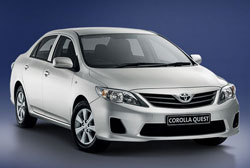
Top stories






More news


Marketing & Media
Ads are coming to AI. Does that really have to be such a bad thing?













This disruption to car manufacturing comes as the National Union of Metalworkers of South Africa (Numsa) said it was considering drawing in members from other sectors to intensify pressure on employers.
The union wants a 10% increase and a one-year agreement‚ or a three-year deal with a 10% wage hike for each successive year.

Numsa will meet today to discuss the possible solidarity action.
Ford and Toyota join other strike-hit car manufacturers such as BMW SA‚ which last week cut production by a third‚ and General Motors SA‚ whose plants have been closed since the start of the strike on July 1.
Reuters reports that Mercedes Benz is concerned about its component supplies dropping to "critical" levels‚ but it is still making cars. It is the striking at component manufacturers that is harming car makers.
Toyota spokeswoman Mary Willemse on Monday confirmed that the company was stopping production of its Corolla‚ Fortuna and Hilux models at its Durban plant.
Ford spokeswoman Rella Bernades said production at its Pretoria plant had been disrupted. "We have temporarily halted production because we have run out of parts."
Production was halted on Monday and would not continue on Tuesday.
National Association of Automobile Manufacturers of South Africa (Naamsa) director Nico Vermeulen said most manufacturers had built up adequate inventory to withstand a two-week strike.
If it took longer than it had already‚ the situation would become more precarious.
Vermeulen said the strike would damage the country's track record as a reliable‚ long-term supplier to global markets.
On Monday‚ Numsa provided detailed feedback to employers on the rejection of their latest offer.
Employer organisation Steel and Engineering Industries Federation of Southern Africa (Seifsa) had offered the union a three-year agreement with a 10% increase in the first year‚ 9.5% in the second year and 9% in the third.
Numsa members rejected the offer‚ saying they would be willing to drop their demand from 12% to 10% in a one-year agreement.
Seifsa CEO Kaizer Nyatsumba described the situation as a "stalemate". The offer Numsa rejected was the "very final mandate" members had given to the employer's body.
"The council has made it clear that is the best it can do‚" he said.
National Employers Association of SA CEO Gerhard Papenfus criticised South Africa's collective bargaining system‚ saying it was unaffordable. Rampant and uncontrolled unionism had become "unaffordable".
Numsa general secretary Irvin Jim said the "ball is in their court"‚ referring to employers. He was aware that the strike would have a knock-on effect in other sectors of the economy.
"If this strike is not resolved quickly the rest of economy will be affected‚ which is why we are very flexible‚" Jim said.
"We have given employers flexible conditions‚ but they cannot blackmail workers by using the effect on the economy ."
Other outstanding issues were Numsa's demand for a ban on labour brokers and a housing allowance.
Numsa has softened its stance on labour brokers‚ with Jim conceding on Monday that a "ban" may be too "rough" on employers.
"Here we are saying to them‚ we are willing to give you a year to phase it out if you are under pressure."

For more than two decades, I-Net Bridge has been one of South Africa’s preferred electronic providers of innovative solutions, data of the highest calibre, reliable platforms and excellent supporting systems. Our products include workstations, web applications and data feeds packaged with in-depth news and powerful analytical tools empowering clients to make meaningful decisions.
We pride ourselves on our wide variety of in-house skills, encompassing multiple platforms and applications. These skills enable us to not only function as a first class facility, but also design, implement and support all our client needs at a level that confirms I-Net Bridge a leader in its field.
Go to: http://www.inet.co.za